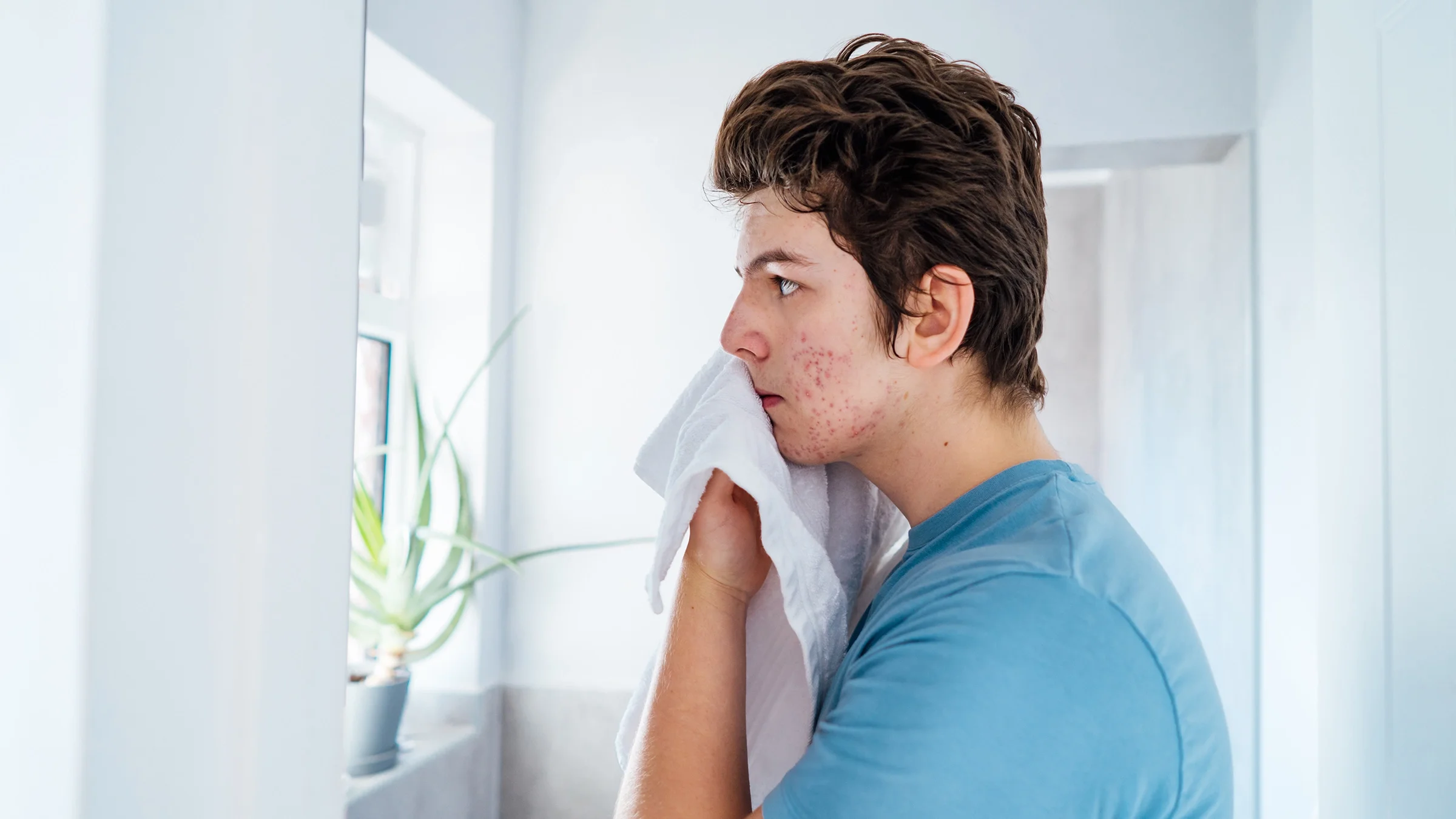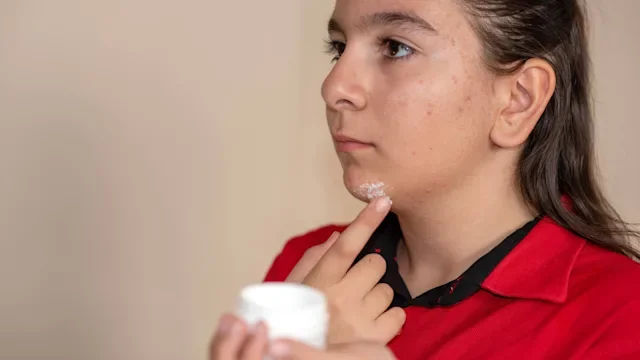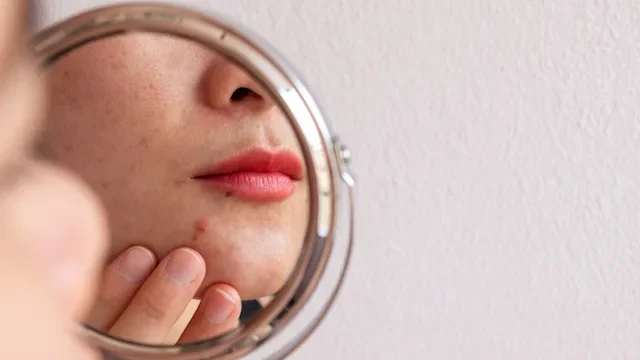Key takeaways:
While the role of diet in acne continues to be debated, there’s strong evidence linking sugar and other high-glycemic foods to worse acne and more severe breakouts.
Sugar and other high-glycemic foods cause your blood sugar and insulin levels to rise, which may lead to inflammation and hormonal changes that can cause acne flare-ups.
Sticking to a low-glycemic diet full of whole grains, fruits, vegetables, nuts, and seeds may help prevent breakouts or lessen their severity.
If you’re looking for ways to prevent or improve your acne, there are plenty of treatments to try. But you might also consider looking at your diet. You may already suspect that certain foods are causing your breakouts. If so, you may be onto something.
Research suggests that what you eat does make a difference when it comes to the health of your skin. Let’s take a look at what science says about the connection between acne and diets high in sugar.
What causes acne?
Acne is more than pimples and blackheads. It’s an inflammatory skin disorder that affects the hair follicle and oil glands in the skin.
Search and compare options
Together, the hair follicle and oil glands make up the pores. These pores open to the surface of the skin. If the pores get clogged or inflamed, they can turn into pimples.
There are five main causes of acne:
Too much oil (sebum) on the skin
Thickened hair follicles
Inflammation
Bacteria on the skin’s surface
Excess androgen hormones
Anything that influences these five things can cause acne or worsen acne that’s already there. And the foods you eat — including sugar — can have an impact on all five.
What’s the best acne treatment? There are many different acne treatments, and finding the best one for you depends on your acne type, severity, and where on the body you have it.
Acne skin care basics: Here’s how to build a skin care regimen that tackles the root cause of your acne.
Do greasy foods cause acne? Fried food gets a bad rap when it comes to breakouts. But fat hasn’t been proven to cause acne.
The connection between sugar and acne
Sugar affects both your blood sugar (or blood glucose) and insulin levels.
When you eat foods with lots of sugar, it causes a sharp spike in your blood sugar level. Your body then releases a lot of insulin to bring the blood sugar level back down.
- ActiclateDoxycycline Hyclate
- MorgidoxDoxycycline Hyclate
- VibramycinDoxycycline Hyclate
Higher levels of blood sugar and insulin play a key role in the development of acne (more on this below). So, foods that raise your blood sugar slowly are better for acne than foods that raise your blood sugar quickly. That’s because these foods don’t cause dramatic spikes in blood sugar and insulin.
The glycemic index (GI) is a rating system that ranks different foods based on how quickly they raise your blood sugar levels. Foods high in sugar and complex carbohydrates are referred to as “high-glycemic” foods. Examples of high-glycemic foods include:
Foods made with refined white flour, such as white bread, pasta, and pastries
White rice
Instant oatmeal
Sugary drinks
Packaged food items such as cereal and crackers
Candy
Examples of foods that are lower on the GI include:
Foods made with whole grains, such as wheat bread, quinoa, and brown rice
Most fruits and vegetables
Unsweetened dairy products
Nuts
Lentils and beans
How does sugar make acne worse?
Diets high in sugar can lead to acne in several different ways. While researchers are still learning about the ways in which sugar can make acne worse, here’s what they do know.
High blood sugar increases inflammation
Acne is an inflammatory skin condition. This means that anything that causes inflammation in the body may trigger acne flares.
High blood sugar — called hyperglycemia — leads to increased inflammation in the body.
This inflammation can cause thickened hair follicles and increased sebum (oil) on the skin. Both of these things can lead to new or worse breakouts.
Insulin leads to more androgen hormones
There’s a reason puberty is linked to acne. During puberty, there’s an increase in androgen hormones in the body. This causes the skin to produce more sebum, or oil. This extra oil can clog pores and lead to pimples.
But even if you’re long past your teenage years, the food you eat can also influence androgen hormones.
As mentioned above, eating sugar and other high-glycemic foods leads to higher insulin levels. And higher insulin levels prompt the adrenal glands to produce more androgen hormones. These hormones lead to more acne-causing sebum.
High-glycemic index foods change your microbiome
What you eat affects your gut microbiome — the trillions of organisms that line your digestive system. Eating a diet filled with high-glycemic foods can cause an unhealthy imbalance between the good and bad bacteria in your gut.
Research suggests that people with acne are also more likely to have altered gut bacteria, with fewer of the “good” bacteria in their gut. It’s not exactly clear how the gut microbiome affects the skin, but some studies suggest that the altered bacteria present in the gut can also affect the skin. So, eating a diet high in sugar may contribute to acne by causing more of those “bad” bacteria to thrive.
What research has been done on the link between sugar and acne?
There’s evidence that high-glycemic diets cause new or worsening acne. One review looked at the results of 24 different studies on the link between acne and a diet high in sugar and high-glycemic foods. Researchers found that:
People who ate more sugar and high-glycemic foods had more acne lesions and worse breakouts.
In the majority of studies, people who switched to a low-glycemic diet developed fewer pimples and fewer breakouts. This shows that changing your diet can be a helpful intervention.
It’s also possible that other lifestyle and environmental factors play a role. There’s still more research needed to better understand the connection.
How does sugar affect overall skin health?
Sugar can negatively affect your skin in more ways than just increased breakouts. Since sugar can lead to inflammation, it can increase the chances of other skin conditions, such as:
Eczema
Psoriasis
High-sugar diets also promote a process called glycation, which is when sugar becomes attached to proteins like collagen and elastin in our skin. Glycation creates harmful molecules called advanced glycation end products (AGEs). Over time, AGEs accumulate in the skin and lead to visible signs of aging, including fine lines, wrinkles, and sagging skin.
Will avoiding sugar improve skin?
While avoiding sugar is unlikely to cure your acne, it may improve your acne and the overall appearance of your skin.
Research shows people who adhere to a low-glycemic diet, avoid processed foods, and limit refined carbohydrates are less likely to have acne. And adhering to a low-glycemic diet has been linked to less severe and shorter breakouts.
It’s important to remember there are many causes and contributors to acne. Sugar is just part of the picture. Lifestyle factors, as well as other foods and vitamins — like dairy products, whey protein, and vitamins D and B12 — may play a role and are being actively researched.
The bottom line
When it comes to preventing acne, scientists are still learning about the role diet plays. But the research does support a link between sugar and acne. Avoiding sugar may not cure your acne, but it’s likely to help. Opting for low-glycemic foods such as whole grains, fruits, and vegetables can decrease inflammation and help keep your blood sugar and insulin levels steady. This may lead to fewer pimples, less severe breakouts, and improved skin health overall.

Why trust our experts?



References
Abbasi, J. (2015). Too much vitamin B12 linked to acne. LiveScience.
Belli, A. A., et al. (2016). The relationship between rosacea and insulin resistance and metabolic syndrome. European Journal of Dermatology.
Conforti, C., et al. (2021). Acne and diet: A review. International Journal of Dermatology.
De Pessemier, B., et al. (2021). Gut–skin axis: Current knowledge of the interrelationship between microbial dysbiosis and skin conditions. Microorganisms.
Katta, R., et al. (2014). Diet and dermatology. Journal of Clinical and Aesthetic Dermatology.
Kucharska, A., et al. (2016). Significance of diet in treated and untreated acne vulgaris. Advances in Dermatology and Allergology.
Kumari, R., et al. (2013). Role of insulin resistance and diet in acne. Indian Journal of Dermatology, Venerology and Leprology.
Ma, X., et al. (2022). Excessive intake of sugar: An accomplice of inflammation. Frontiers in Immunology.
Meixiong, J., et al. (2022). Diet and acne: A systematic review. Journal of the American Academy of Dermatology International.
Muhaidat, J., et al. (2024). The effect of whey protein supplements on acne vulgaris among male adolescents and young adults: A case-control study from north of Jordan. Dermatology Research and Practice.
Pilz, S., et al. (2011). Effect of vitamin D supplementation on testosterone levels in men. Hormone and Metabolic Research.
Sanchez-Pellicer, P., et al. (2022). Acne, microbiome, and probiotics: The gut–skin axis. Microorganisms.
ScienceDirect. (n.d.). Search results for acne vulgaris.
Seo, Y. S., et al. (2020). Dietary carbohydrate constituents related to gut dysbiosis and health. Microorganisms.
Smith, R. N., et al. (2007). A low-glycemic-load diet improves symptoms in acne vulgaris patients: A randomized controlled trial. American Journal of Clinical Nutrition.
Sun, Q., et al. (2014). New insights into insulin: The anti-inflammatory effect and its clinical relevance. World Journal of Diabetes.
Sutaria, A. H., et al. (2023). Acne vulgaris. StatPearls.
Tanghetti, E. A. (2013). The role of inflammation in the pathology of acne. Journal of Clinical and Aesthetic Dermatology.
Ursell, L. K., et al. (2012). Defining the human microbiome. Nutrition Reviews.














